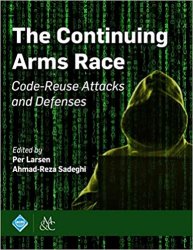 Название: The Continuing Arms Race: Code-Reuse Attacks and Defenses
Название: The Continuing Arms Race: Code-Reuse Attacks and Defenses Автор: Per Larsen, Ahmad-Reza Sadeghi
Издательство: ACM Books
Год: 2018
Страниц: 304
Язык: английский
Формат: pdf (true)
Размер: 10.85 MB
As human activities moved to the digital domain, so did all the well-known malicious behaviors including fraud, theft, and other trickery. There is no silver bullet, and each security threat calls for a specific answer. One specific threat is that applications accept malformed inputs, and in many cases it is possible to craft inputs that let an intruder take full control over the target computer system.
The nature of systems programming languages lies at the heart of the problem. Rather than rewriting decades of well-tested functionality, this book examines ways to live with the (programming) sins of the past while shoring up security in the most efficient manner possible. We explore a range of different options, each making significant progress towards securing legacy programs from malicious inputs.
Attackers exploit security vulnerabilities in modern software with the ultimate goal of taking control over the underlying computing platforms. There are various causes of these vulnerabilities, the foremost being that the majority of software (including operating systems) is written in unsafe programming languages (mainly C and C++) and by developers who are by-and-large not security experts.
Memory errors are a prominent vulnerability class in modern software: they persist for decades and still are used as the entry point for today’s state-of-the-art attacks. The canonical example of a memory error is the stack-based buffer overflow vulnerability, where the adversary overflows a local buffer on the stack, and overwrites a function’s return address. While modern defenses protect against this attack strategy, many other avenues for exploitation exist, including those that leverage heap, format string, or integer overflow vulnerabilities.
As mentioned above, the continued success of these attacks is mainly attributed to the fact that large portions of software programs are implemented in type-unsafe languages (C, C++, or Objective-C) that do not guard against malicious program inputs using bounds checking, automatic memory management, etc. However, even type-safe languages like Java rely on virtual machines and complex runtimes that are in turn implemented in type-unsafe languages out of performance concerns. Unfortunately, as modern applications grow more complex, memory errors and vulnerabilities will likely continue to exist, with no end in sight.
The solutions explored include enforcement-type defenses, which excludes certain program executions because they never arise during normal operation. Another strand explores the idea of presenting adversaries with a moving target that unpredictably changes its attack surface thanks to randomization. We also cover tandem execution ideas where the compromise of one executing clone causes it to diverge from another thus revealing adversarial activities. The main purpose of this book is to provide readers with some of the most influential works on run-time exploits and defenses. We hope that the material in this book will inspire readers and generate new ideas and paradigms.
Contents:
Скачать The Continuing Arms Race: Code-Reuse Attacks and Defenses
